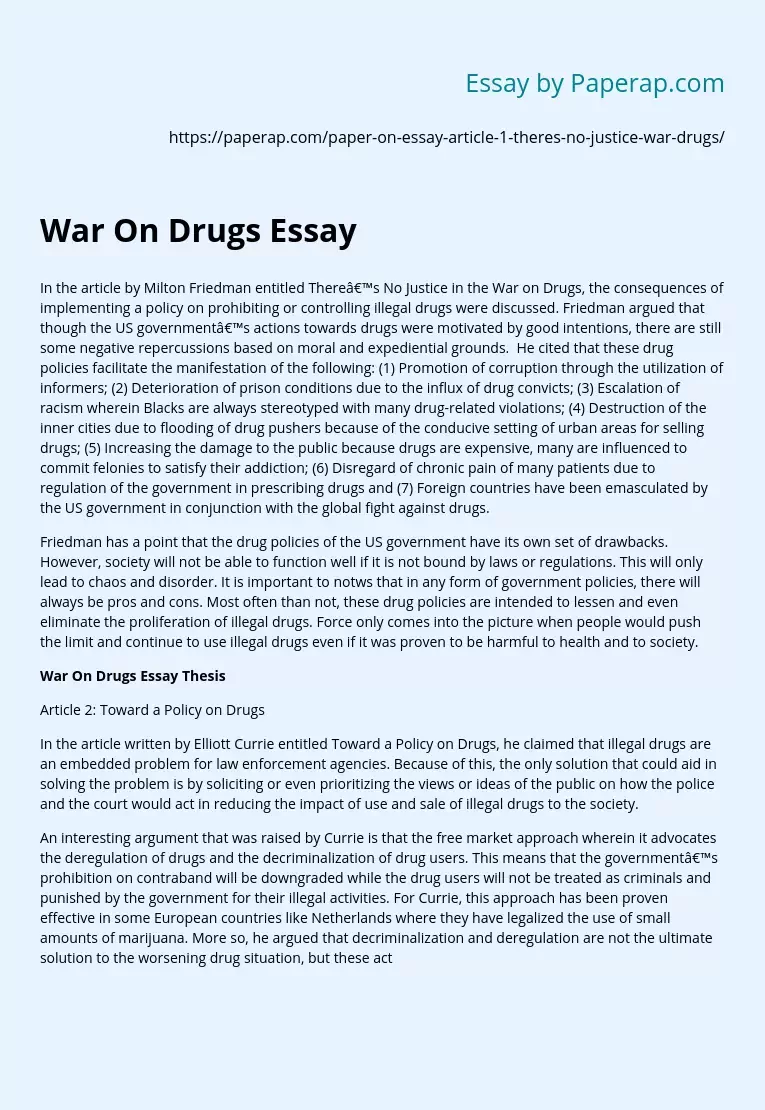In the article by Milton Friedman entitled There’s No Justice in the War on Drugs, the consequences of implementing a policy on prohibiting or controlling illegal drugs were discussed. Friedman argued that though the US government’s actions towards drugs were motivated by good intentions, there are still some negative repercussions based on moral and expediential grounds. He cited that these drug policies facilitate the manifestation of the following: (1) Promotion of corruption through the utilization of informers; (2) Deterioration of prison conditions due to the influx of drug convicts; (3) Escalation of racism wherein Blacks are always stereotyped with many drug-related violations; (4) Destruction of the inner cities due to flooding of drug pushers because of the conducive setting of urban areas for selling drugs; (5) Increasing the damage to the public because drugs are expensive, many are influenced to commit felonies to satisfy their addiction; (6) Disregard of chronic pain of many patients due to regulation of the government in prescribing drugs and (7) Foreign countries have been emasculated by the US government in conjunction with the global fight against drugs.
Friedman has a point that the drug policies of the US government have its own set of drawbacks.
However, society will not be able to function well if it is not bound by laws or regulations. This will only lead to chaos and disorder. It is important to notws that in any form of government policies, there will always be pros and cons. Most often than not, these drug policies are intended to lessen and even eliminate the proliferation of illegal drugs.
Force only comes into the picture when people would push the limit and continue to use illegal drugs even if it was proven to be harmful to health and to society.
War On Drugs Essay Thesis
Article 2: Toward a Policy on Drugs
In the article written by Elliott Currie entitled Toward a Policy on Drugs, he claimed that illegal drugs are an embedded problem for law enforcement agencies. Because of this, the only solution that could aid in solving the problem is by soliciting or even prioritizing the views or ideas of the public on how the police and the court would act in reducing the impact of use and sale of illegal drugs to the society.
An interesting argument that was raised by Currie is that the free market approach wherein it advocates the deregulation of drugs and the decriminalization of drug users. This means that the government’s prohibition on contraband will be downgraded while the drug users will not be treated as criminals and punished by the government for their illegal activities. For Currie, this approach has been proven effective in some European countries like Netherlands where they have legalized the use of small amounts of marijuana. More so, he argued that decriminalization and deregulation are not the ultimate solution to the worsening drug situation, but these actions would significantly lessen the illogical and cruel methods currently used to combat the use and sale of illegal drugs. Moreover, it has been studied that there is a correlation between the prohibition of drugs and the existence of crimes and violence in communities. With this notion, if prohibited drugs would be made legal then it safe to assume that the occurrence of drug-related crimes will decline decrease that would eventually lead to the elimination of the problem. However, people should not solely depend on this type of approach because there are other factors and complexities involved that cannot be addressed by this approach. The fight against drugs has been protracted and ineffective. To be able to come up with a practical solution with lesser repercussions, different perspectives and thoughts are needed in order to see the problem in a comprehensive manner so that every detail or peculiarity can be tackled.
War On Drugs Essay. (2019, Dec 05). Retrieved from https://paperap.com/paper-on-essay-article-1-theres-no-justice-war-drugs/

